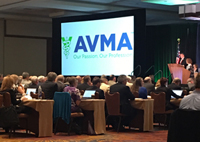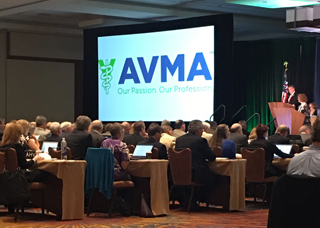
AVMA 320

VIN News Service photo
The American Veterinary Medical Association House of Delegates, pictured in 2017 in Indianapolis, gathers twice a year to make policy and discuss topics relevant to the profession. Delegates were supposed to meet this week in San Diego but will gather remotely due to the pandemic.
The American Veterinary Medical Association is overly white, bureaucratic and needs to undertake major changes to welcome racial and ethnic minorities that are underrepresented in the national membership organization and within the profession as a whole, according to a message anticipated to be part of a video presentation to the AVMA House of Delegates this week.
The policymaking body, comprised of some 160 representatives of state, allied and government groups, begins its two-day annual meeting Thursday, conducted remotely due to the coronavirus pandemic.
AVMA leaders "recognize that it's an important topic," said Dr. Christina V. Tran, a first-generation Filipino American and president of the Multicultural Veterinary Medical Association, reflecting on a private videoconference attended Saturday by eight veterinary groups in support of diversity, equity and inclusion and officials of the national organization. "They made it clear that they wanted to have open dialogue. Saturday was a step in the right direction, but much more work needs to be done."
While the issue is unlikely to be discussed during this week's House meeting, owing to its late introduction to the agenda and limitations of hosting such a discussion online, Tran said AVMA staff promised to revisit the topic of diversity in coming weeks. An online petition that's garnered more than 3,200 signatures since its posting on July 19 calls on the AVMA to commit to addressing the homogeneous nature of its membership and the lack of racial and ethnic diversity in the profession at large and concerns about systemic racism.
"Veterinary medicine's ongoing lack of diversity, equity, and inclusivity has been discussed ad nauseam over the last few decades, drawing much attention well beyond the field itself," the petition reads. "Today, the problem is long past recognition and, as a result, the letter will not dwell on a fact well understood by the majority of the profession. Instead, we write this letter as a call to action, to underscore the necessity for the leaders in this profession to act swiftly and effectively to remedy these problems."
According to U.S. Bureau of Labor Statistics labor force estimates, the profession is overwhelmingly white (89.8%) and female (68.3%). The Labor Department data, based on a population survey, recorded no Black veterinarians; Asian and Latino or Hispanic veterinarians comprise 6.1% and 1.6% of the profession, respectively.
The government's race and ethnicity statistics are not comprehensive, however. While chronically underrepresented, numbers of Black veterinarians have steadily increased in recent decades. The Association of American Veterinary Medical Colleges reports that 2.8% of all applicants to veterinary schools and 3% of veterinary students are Black.
Black Americans make up 14.6% of the U.S. population, according to U.S. Census Bureau data from 2018.
Tran said she doesn't need statistics to know that the profession and its national organization are overwhelmingly white and do not reflect the demographics of society.
"Other health professions seem to have more success in moving the needle and creating a diverse population than we have in veterinary medicine," she said. "… If you're in a place of power and privilege, white men and women, there has to be some understanding and recognition that you also have some level of responsibility to change so you can serve a more diverse population."
The petition's call to "address systemic racism in veterinary medicine" urges the AVMA to implement a long list of operational changes and adopt dozens of initiatives. Some include:
- Self-assess via an internal audit to determine where the association stands on diversity, equity and inclusion.
- Reduce terms and requirements for AVMA members to attain leadership roles and move up the organization's ranks.
- Implement accountability processes on diversity and be transparent about them.
- Track and report incidents of discrimination and harassment.
- Hold regular meetings with minority groups.
- Require ethnic and gender questions for all AVMA members while maintaining the ‘prefer not to answer' option on membership applications.
- Actively recruit underrepresented minorities to participate in the AVMA.
- Ensure that AVMA and its leadership are culturally competent and acting in the best interests of all of members.
- Require, at minimum, annual diversity, equity and inclusion training for new and continuing AVMA staff and volunteers.
- Establish and fund a Diversity, Equity and Inclusion Council and hire a director for it.
- Research and publish disparities in salary, practice ownership, career tracks, faculty positions, and similar features of the veterinary profession as they pertain to race and ethnicity.
- Fund additional research to advance matters involving race and ethnicity within the veterinary profession, including barriers to care in underserved communities of color, racial/ethnic disparities in public health, barriers to entry into the profession, etc.
"We recognize that some of the actions listed above may not fall solely under the purview of the AVMA; however, we trust that the AVMA leadership will work in close partnership with veterinary organizations and institutions to implement the actionables," the petition states. "It is also our hope that these actionables will be shared widely and implemented by everyone in the veterinary community — organizations, industry, businesses and academic institutions."
Two resolutions on agenda
The House aims to consider and vote on two resolutions to revise existing AVMA policies, both submitted by the AVMA Board of Directors.
Suggested changes for the policy titled "Transportation of Research Animals for the Purpose of Biomedical Research, Testing, and Education" are a result of a regularly scheduled review by the AVMA Animal Welfare Committee. The new version to be considered by the House includes language to reiterate that moving animals should be done humanely, with welfare in mind and in consultation with a veterinarian.
"Veterinarians are responsible for ensuring the appropriate transportation of animals for research, testing, and education, and therefore should be involved in the evaluation of specific transportation methods," the draft policy reads. "Both air and ground transportation methods should be available in order to select the method(s) that provide the highest degree of animal welfare protection, taking into consideration the animal species and particular transportation situation."
A revised policy on antiparasitic resistance resulted from a regularly scheduled review by the AVMA Council on Biologic and Therapeutic Agents. The proposed revisions were made available for comment by all AVMA members but none was received, the resolution states.
The revisions:
- Delete the list of parasites known to have developed resistance to common parasiticides, as the list is not exhaustive.
- Recommend that veterinarians lead the decision-making process regarding use of parasiticides.
- Recommend that antiparasitic drug sensitivity studies be considered by veterinarians when making decisions about parasite control.
Absent from agenda
A group of state veterinary medical associations withdrew a resolution to expand an AVMA dues discount for newer graduates, noting that the resolution might generate a lot of debate that could be difficult to accommodate and manage in the meeting's remote format.
Right now, new veterinarians can be AVMA members for free during the year they graduate; and for the next two renewal periods, their dues are half of the regular annual membership fee ($360 this year).
A $30 dues increase for nearly all AVMA members, effective this year, passed in 2019.
Update: Delegates unanimously approved resolutions to alter the policies "Transportation of Research Animals for the Purpose of Biomedical Research, Testing, and Education" and "Policy on Antiparasitic Resistance." The group also directed the AVMA Board of Directors to implement actions for greater diversity, equity and inclusion in the profession. The initiative passed by a vote of 92.3%.